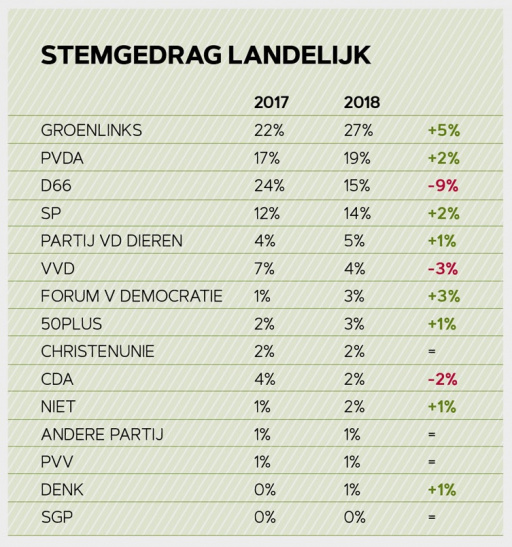Popularity of D66 plummets AObmembers
At the poll below AObmembers in 2016, D66 became the largest party. Now the party is losing a third of the following among the teaching staff. 'D66 promised all kinds of things for education, but has not delivered on it.'

Image: Pixabay
The disappointment about D66 is reflected in an election poll AObmembers. 'I went to D66 because that party had a strong opinion about class size. In other words, classes of around 24. And what is the practice? I have a class of 28, one of 29, one of 30. So Pechtold just talks off his neck ', writes a secondary education teacher when asked about changed voting behavior.
At the beginning of February, the first hundred days of the Rutte III cabinet were over. In addition, municipal elections are on the way. Reason for it Education magazine to ask research agency Regioplan to gauge the vote among its members.
When it comes to those municipal elections, 23 percent do not yet know which party they will vote for. That is hardly surprising AOb'ers vote locally. Nationally, this is 28 percent, making the local parties together the largest party in the Netherlands. At the AOb'ers who have made a choice, will for the time being only 7 percent vote for a local party. In those municipal elections, D66 gets a big blow, if it is up to the education staff. A development that is in line with the national polls.
In last year's parliamentary elections, D66 was still the most popular among the members of the union, but now they have dropped to third place.
Because the cabinet had been on it for a hundred days, we also asked something AObmembers voted in the House of Representatives elections in March last year, plus what they would vote now if there were parliamentary elections. At that time D66 was still the most popular among the members of the union, now they drop to third place.
Disappointment
It is mainly D66 voters who do not yet know what they are going to vote this time, they are disappointed and still searching. The party can therefore still recover. Especially if she more clearly realizes her original election promises in Rutte III. Because if we ask the people who have already made a choice why they are switching parties, then there is great dissatisfaction with the course of education.
'D66 thinks we should be content with the extra money, they would be an educational party... no longer', writes a teacher. Another is disappointed that D66 has not provided the minister for primary and secondary education. A third is very dissatisfied with the results: 'D66 seemed to attach great importance to education, but this turned out to be a hoax.'
'D66 seemed to consider education to be of paramount importance, but this turned out to be a sham.'
Got the lot under the AObmembers in March 2017 still had 24 percent of the vote in education, now it has dropped to 15 percent. Many former PvdA voters say they will return to that party. With this, the PvdA has regained some of the support for education and is the second largest party among the AOb'ers.
GroenLinks makes the biggest profit. Jesse Klaver's party rises to 27 percent of the vote among teaching staff. Although that party is also grumbled a bit, writes an interviewee who switched from GroenLinks to D66: 'D66 is more committed to education policy than GroenLinks, and GroenLinks also missed its great opportunity during the formation.' The SP benefits somewhat less, but is also growing.
De AOb surveyed the voting behavior among the members. The table below shows all the exact results per batch. Also gifts AObmembers scores for the education policy of the cabinet and the ministers.

In connection with the deadline, figures based on 3.300 participants have been used for the story in the Education Magazine. 3.702 fully completed questionnaires were used in the final result. As a result, the final result of the voting record differs very slightly from the version in the Education magazine, and only at the Think parties, Forum for Democracy and PVV. View all results of the AObsurvey and more explanation about the research via this link. This message is an abridged version of the article that appears today in the March 2018 Education Magazine.


